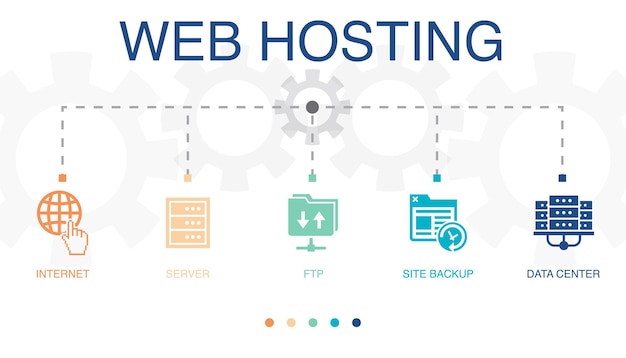
Kleverish Digital Marketing Services That Works  ×
×
 ×
×


In today’s digital world, having an online presence is not just an advantage; it’s a necessity. Whether you’re a business owner, a blogger, or an entrepreneur, a well- hosted website ensures seamless performance, robust security, and an enhanced user experience. As more consumers rely on the internet to find products, services, and information, businesses without a solid online presence risk falling behind their competition.
Website hosting plays a crucial role in ensuring your site remains accessible, fast, and secure. The right hosting service provides high uptime, optimal loading speeds, and the necessary security measures to protect your website from cyber threats. With so many hosting providers and options available, understanding how web hosting works is essential for making an informed decision.
This article will explore the fundamental aspects of website hosting, different hosting types, their benefits, and the key factors to consider when selecting a hosting provider. By the end of this guide, you’ll have the knowledge to choose the best hosting solution based on your specific needs and budget.
This article will explore the fundamental aspects of website hosting, different hosting types, their benefits, and the key factors to consider when selecting a hosting provider. By the end of this guide, you’ll have the knowledge to choose the best hosting solution based on your specific needs and budget.
Website hosting is a fundamental service that enables individuals and businesses to make their websites accessible to users across the globe via the internet. Hosting providers allocate storage space on powerful servers, where all website files, databases, and applications are stored and managed. These servers ensure seamless access to website data, allowing online visitors to interact with the website without delays or interruptions.
When a user types a website address (domain name) into a web browser, the request is sent to the hosting provider’s server, which then retrieves and delivers the requested web pages to the user’s screen. The quality of a hosting provider significantly affects website performance, security, and loading speed. Choosing the right hosting provider is crucial, as it determines a website’s ability to handle traffic efficiently, maintain fast page speeds, ensure data security, and offer a seamless user experience.
In addition to storage and accessibility, web hosting services often include features such as domain management, automated backups, SSL security certificates, email hosting, and technical support. Whether you are launching a personal blog, an e-commerce store, or a corporate website, selecting a reliable hosting solution plays a key role in your website’s long-term success.

Understanding the various hosting types will help you choose the right one based on your needs and budget.
Choosing a hosting provider involves considering multiple factors, including:
Reliable hosting ensures faster loading times, leading to better user engagement and SEO rankings.
Hosting services offer security measures such as SSL certificates, firewalls, and data encryption to protect websites from cyber threats.
As your business grows, hosting services allow easy scalability without disrupting website performance.
A good hosting provider offers 24/7 customer support, ensuring smooth website operations.
Hosting plans cater to various budget requirements, allowing users to find an affordable yet reliable solution.
A good hosting provider ensures regular backups, helping restore data in case of an emergency.
Higher-tier hosting options allow better control over server configurations and settings.
ABC Corporation, an e-commerce business, faced slow website speed and frequent downtimes due to their shared hosting plan. These issues affected sales and customer trust.
ABC Corporation switched to a Cloud Hosting solution, offering:
Choosing the right website hosting is crucial for any online business or personal website. The success of your online presence depends significantly on the hosting provider you choose, as it impacts website performance, security, and scalability. A well-chosen hosting solution ensures seamless accessibility, high-speed performance, and optimal uptime, allowing visitors to interact with your website
without issues. Understanding different hosting types, key features, and benefits helps in making an informed decision tailored to your business or personal needs.
When selecting a hosting provider, it’s essential to consider factors such as server reliability, scalability, customer support, and security features. Investing in a reliable hosting provider with a strong reputation ensures your website runs efficiently, remains protected against cyber threats, and adapts to future growth. Whether you’re planning to launch a blog, an e-commerce store, or a corporate website, the right hosting service plays a critical role in determining long-term success. Prioritizing a high-quality hosting solution will not only enhance user experience but also contribute to improved SEO rankings, leading to better visibility and engagement in the digital landscap

Hello, I’m Arpan, a dedicated social media marketer passionate about crafting engaging content and driving results-driven campaigns. With a keen eye for trends and a strategic approach, I strive to elevate brands and foster meaningful connections with their audience. Let’s collaborate to unlock the full potential of your social media presence!



 Rated 4.99/5 overall
across 100+ reviews
Rated 4.99/5 overall
across 100+ reviews